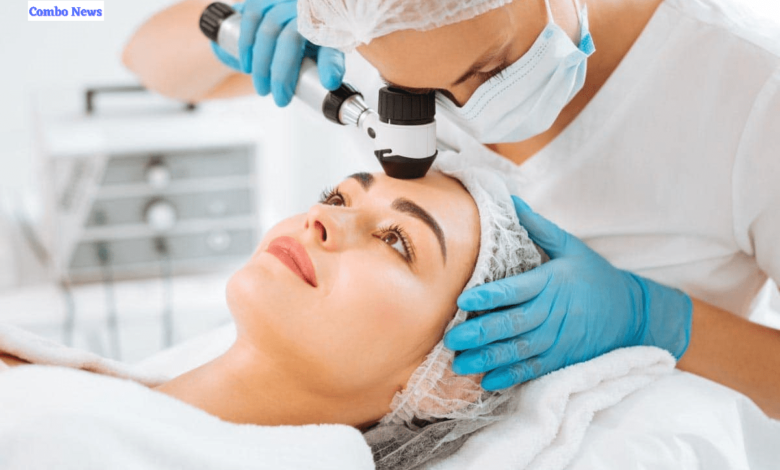All About Cosmetic Dermatology

The biggest organ in the human body, the skin, is vulnerable to harm or impairment from environmental factors. According to the American Academy of Dermatology Association, the study of disorders affecting the skin, hair, and nails is known as dermatology. Our present practice can recognize up to 3,000 conditions.
Psoriasis, skin cancer, and eczema are just a few of the ailments that a dermatologist specializes in treating. While some dermatologists specialize in studying skin-related medical conditions, others may focus on skin aesthetics or appearance, suggesting cosmetic operations to improve a person’s skin tone and look.
In the past ten years, cosmetic dermatology have increased as new, minimally invasive, non-surgical treatment options have become available. This dermatology specialist frequently calls for further education, albeit not always more certification.
Also Read: Why do people suffer from ‘Hangxiety’?
What Do Cosmetic Dermatologists Treat?
Many services treat a person’s concerns about their skin, whether those issues are caused by ageing, UV damage, acne, or other similar conditions. The skin has a modest protective barrier to shield itself from damage. Regular exercise, a balanced diet, and specific skin care products can only go so far in improving the appearance of your skin.
People visit cosmetic dermatologists for a variety of reasons, such as dissatisfaction with their existing appearance or to get advice on proper skin care regimens from an expert. Skin issues can range from chronic, more severe disorders like scars or tattoos to diseases like vitiligo or psoriasis.
Every person has their own skin, which comes with various treatments and cures. These are just a few of the problems that cosmetic dermatologists deal with:
- Ageing, loose skin
- Sun damage
- Scars
- Unwanted hair
- Acne
- Tattoos
- Benign moles
- Hyperpigmentation and dark spots
- Rosacea, spider veins, or other vascular lesions.
Numerous skin disorders can be treated in various methods, but in most cases, a consultation with a board-certified dermatologist is necessary. They’ll be able to spot issues with the condition of your skin, suggest specific treatments, and issue prescriptions for medications you can use as part of your regular skin care regimen.
As the medical director and CEO of Enhance Medical Group, Dr Lindsay Clark, MD, explains, “While it is possible to target undesirable skin conditions through a proper skin care regimen at home, DIYs and simple experimentation at home cannot fully target the underlying complications, and without the appropriate knowledge of product ingredients being used, it may do more harm than good.”
Cosmetic doctors may utilise specific treatments like chemical peels and lasers or treat with a combination of procedures, depending on the severity and complexity of the patient’s skin problem.
Chemical Peels
Getting a chemical peel properly performed by your dermatologist has several advantages, even though the procedure’s name may sound intimidating. The procedure aids in removing the epidermis and stimulates the production of new skin cells, making one look more youthful. Alpha-hydroxy acids, including glycolic acid, lactic acid, and salicylic acid, are a few examples of chemicals employed.
Each chemical compound penetrates the skin at a different level, treating the following problems:
- wrinkles and fine lines
- Hyperpigmentation and areas of darkness
- scars from acne and outbreaks
- rough skin texture
- sun damage
After determining your skin type and product sensitivity, your dermatologist may employ a mix of various chemical agents. While there are products for chemical peels that can be used at home, this should only be done after careful consideration and at one’s own risk. It is strongly advised to leave chemical peels to the experts since the operation could result in burns and skin discoloration in addition to the harm you already had.
Laser surgery employs strong, correcting light beams for more severe and difficult-to-treat skin defects. The high-power light creates regulated damage that triggers the body’s natural healing process, enhancing the skin’s general appearance.
There are several laser procedures available to treat both medical illnesses and aesthetic difficulties, including the following:
- Stretch marks
- Atrophic acne scarring
- Tattoos
- Psoriasis
- Rosacea
- Loose and saggy skin
These are just a few diseases that laser treatments can help with, but many other things can be done with this new technology in dermatology. Despite being performed as a licencing procedure, cosmetic treatments are not covered by health insurance and can be expensive when paid for out of pocket. Given that the results of laser treatments are typically long-lasting and only a few sessions are necessary to fully treat the problem, they may be worthwhile in the long run.
Body Contouring
This invasive surgery eliminates subcutaneous fat, typically created due to poor eating habits or inactivity. People can choose to have contouring procedures like liposuction, which involves vacuuming out fat tissue and is done under anaesthetic. This results in sagging areas that can take months to repair naturally. Laser treatments and other procedures can hasten the healing process.
There are non-invasive surgical contouring alternatives, such as cryolipolysis, ultrasound, diathermy, mesotherapy, and radiofrequency. These are just a few alternatives, but body sculpting shouldn’t replace long-term weight loss plans, a good diet, and an active lifestyle.
When is a doctor consultation required?
Psychologists will tell you that you are not alone if you have considered scheduling an appointment with your local cosmetic dermatologist. People choose to get a professional’s help to achieve their desired image for many reasons. One can argue that media and advertising adversely affect our self-perception of beauty.
Some common reasons people might choose to see a cosmetic dermatologist could be to feel more accepted by peers, increase their confidence, recapture that youthful look, and look for other ways to love themselves.
Suppose you are worried about a particular skin condition. In that case, a visit to your local dermatology clinic or medspa may be in order, whether it be an itchy rash or cystic acne.
Read More: SNAP: Is it the same as food stamps?








